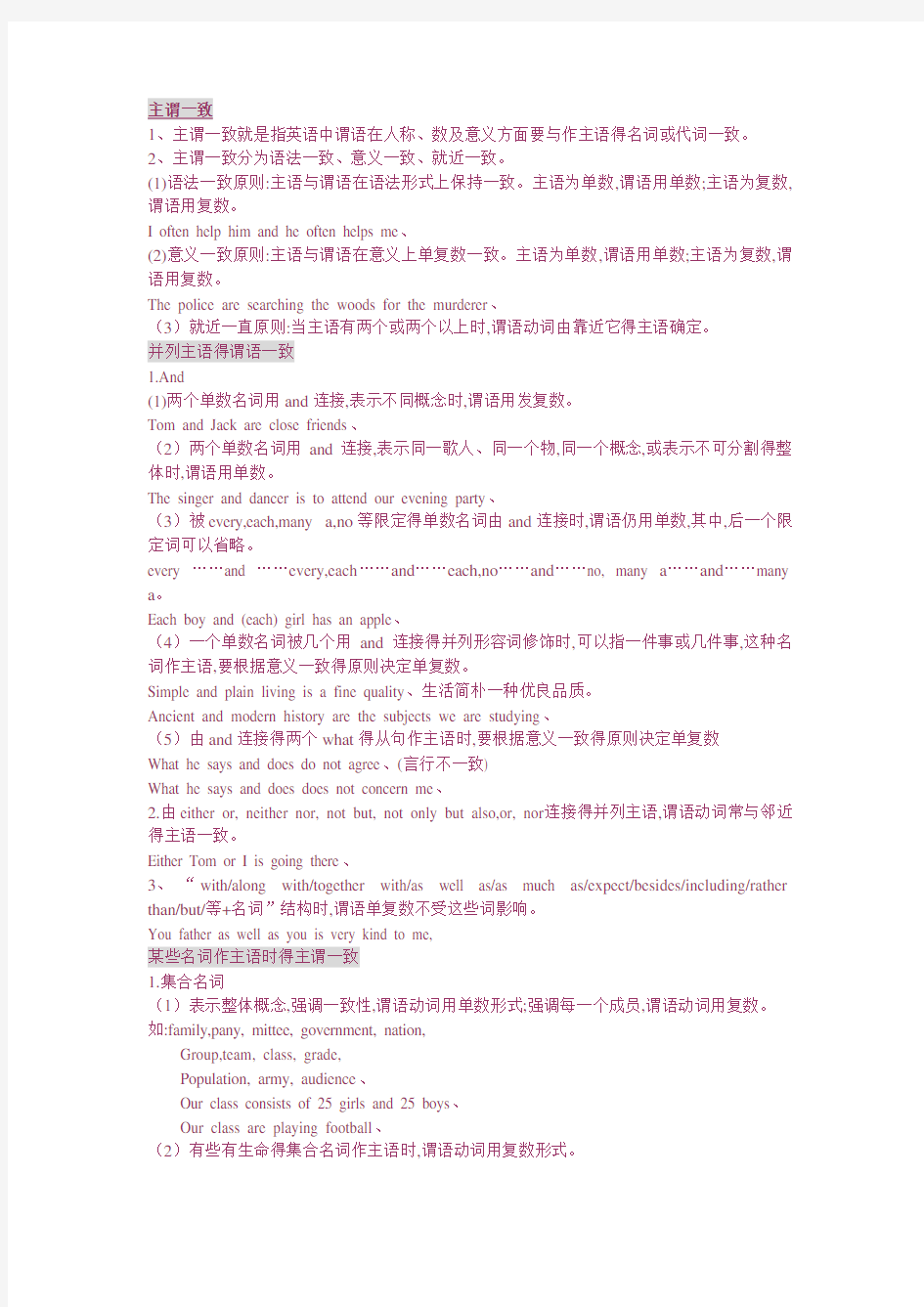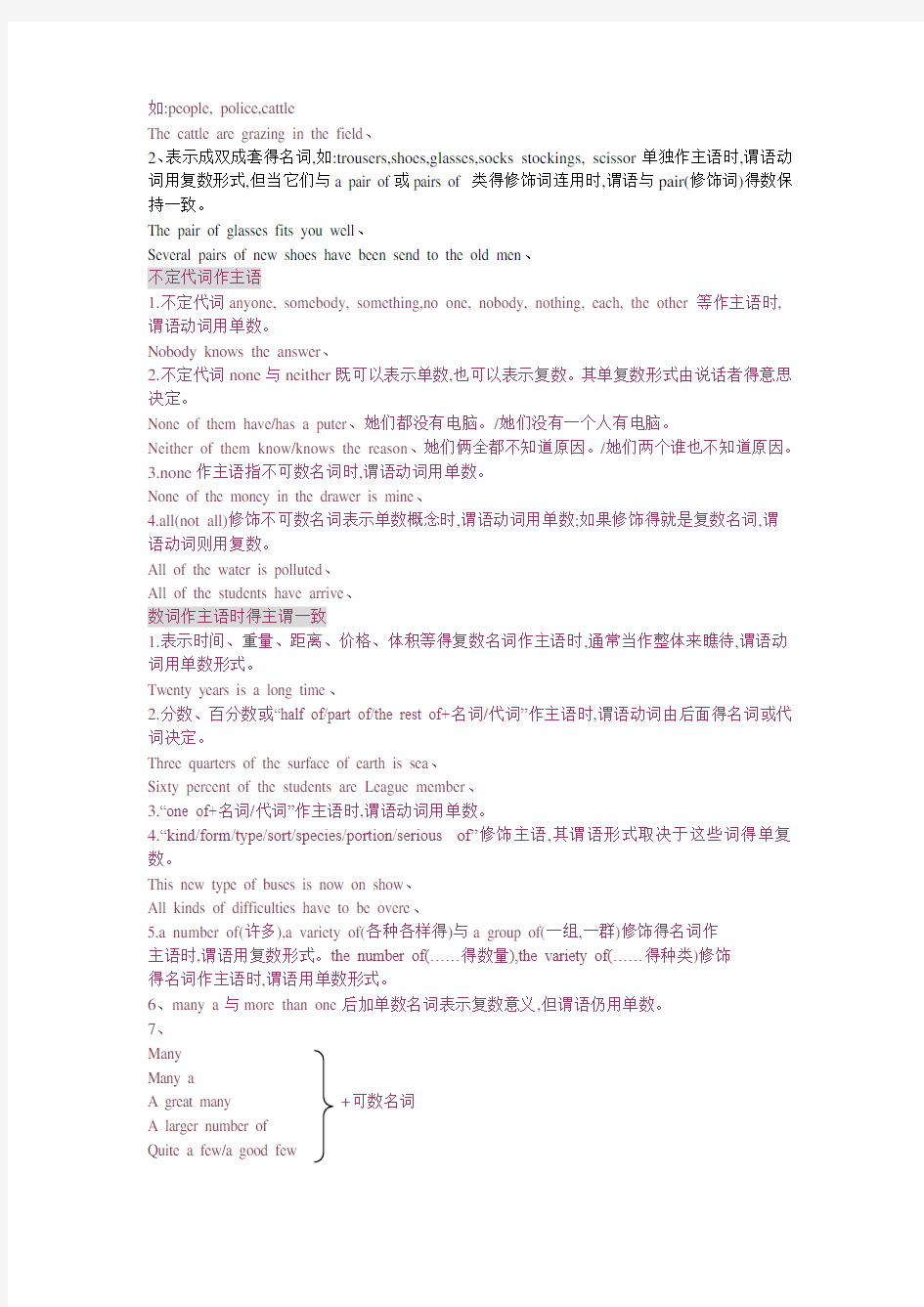

1、主谓一致就是指英语中谓语在人称、数及意义方面要与作主语得名词或代词一致。
2、主谓一致分为语法一致、意义一致、就近一致。
(1)语法一致原则:主语与谓语在语法形式上保持一致。主语为单数,谓语用单数;主语为复数,谓语用复数。
I often help him and he often helps me、
(2)意义一致原则:主语与谓语在意义上单复数一致。主语为单数,谓语用单数;主语为复数,谓语用复数。
The police are searching the woods for the murderer、
(3)就近一直原则:当主语有两个或两个以上时,谓语动词由靠近它得主语确定。
并列主语得谓语一致
1.And
(1)两个单数名词用and连接,表示不同概念时,谓语用发复数。
Tom and Jack are close friends、
(2)两个单数名词用and连接,表示同一歌人、同一个物,同一个概念,或表示不可分割得整体时,谓语用单数。
The singer and dancer is to attend our evening party、
(3)被every,each,many a,no等限定得单数名词由and连接时,谓语仍用单数,其中,后一个限定词可以省略。
every ……and ……every,each……and……each,no……and……no, many a……and……many a。
Each boy and (each) girl has an apple、
(4)一个单数名词被几个用and连接得并列形容词修饰时,可以指一件事或几件事,这种名词作主语,要根据意义一致得原则决定单复数。
Simple and plain living is a fine quality、生活简朴一种优良品质。
Ancient and modern history are the subjects we are studying、
(5)由and连接得两个what得从句作主语时,要根据意义一致得原则决定单复数
What he says and does do not agree、(言行不一致)
What he says and does does not concern me、
2.由either or, neither nor, not but, not only but also,or, nor连接得并列主语,谓语动词常与邻近得主语一致。
Either Tom or I is going there、
3、“with/along with/together with/as well as/as much as/expect/besides/including/rather than/but/等+名词”结构时,谓语单复数不受这些词影响。
You father as well as you is very kind to me,
某些名词作主语时得主谓一致
1.集合名词
(1)表示整体概念,强调一致性,谓语动词用单数形式;强调每一个成员,谓语动词用复数。如:family,pany, mittee, government, nation,
Group,team, class, grade,
Population, army, audience、
Our class consists of 25 girls and 25 boys、
Our class are playing football、
(2)有些有生命得集合名词作主语时,谓语动词用复数形式。
如:people, police,cattle
The cattle are grazing in the field、
2、表示成双成套得名词,如:trousers,shoes,glasses,socks stockings, scissor单独作主语时,谓语动词用复数形式,但当它们与a pair of或pairs of 类得修饰词连用时,谓语与pair(修饰词)得数保持一致。
The pair of glasses fits you well、
Several pairs of new shoes have been send to the old men、
不定代词作主语
1.不定代词anyone, somebody, something,no one, nobody, nothing, each, the other等作主语时,
谓语动词用单数。
Nobody knows the answer、
2.不定代词none与neither既可以表示单数,也可以表示复数。其单复数形式由说话者得意思决定。
None of them have/has a puter、她们都没有电脑。/她们没有一个人有电脑。
Neither of them know/knows the reason、她们俩全都不知道原因。/她们两个谁也不知道原因。
3.none作主语指不可数名词时,谓语动词用单数。
None of the money in the drawer is mine、
4.all(not all)修饰不可数名词表示单数概念时,谓语动词用单数;如果修饰得就是复数名词,谓
语动词则用复数。
All of the water is polluted、
All of the students have arrive、
数词作主语时得主谓一致
1.表示时间、重量、距离、价格、体积等得复数名词作主语时,通常当作整体来瞧待,谓语动词用单数形式。
Twenty years is a long time、
2.分数、百分数或“half of/part of/the rest of+名词/代词”作主语时,谓语动词由后面得名词或代词决定。
Three quarters of the surface of earth is sea、
Sixty percent of the students are League member、
3.“one of+名词/代词”作主语时,谓语动词用单数。
4.“kind/form/type/sort/species/portion/serious of”修饰主语,其谓语形式取决于这些词得单复数。
This new type of buses is now on show、
All kinds of difficulties have to be overe、
5.a number of(许多),a variety of(各种各样得)与a group of(一组,一群)修饰得名词作
主语时,谓语用复数形式。the number of(……得数量),the variety of(……得种类)修饰
得名词作主语时,谓语用单数形式。
6、many a与more than one后加单数名词表示复数意义,但谓语仍用单数。
7、
Many
Many a
A great many +可数名词
A larger number of
Quite a few/a good few
Much
A great deal of
A larger amount of/large amounts of +不可数名词
Quite a little
A lot of/lots of
A large quantity of/large quantities of +可数名词复数或不可数名词
Plenty of
A larger amount of +不可数名词后面跟单数谓语动词
large amounts of+不可数名词后面跟复数谓语动词
也就就是说,由amount得数来决定谓语得单复数。有类似用法得还有:
A mass of/masses of
A quantity of/quantities of
A variety of/varieties of
There be句型得主谓一致
当主语就是两个或两个或两个以上得名词或短语并列时,be得形式通常与与之靠近得一个名词或短语保持一致。
There is a desk and four chairs in the room、
There are four chairs and a desk in the room、
其她
1.表示单一概念得动名词、不定式或从句作主语时,谓语用单数。
Smoking is a bad for your health、
2.what引导得主语从句,谓语动词一般用单数形式,但若从句后得表语就是复数形式,则谓语动词用复数形式。
what the poor need most is the ambition to bee rich、
What we need are qualified teachers、
3.关系代词who, that, which在定语从句中作主语时,其谓语得数与先行词一致。
He is one of the students who have pass the exam、
He is the only one of the students who has pass the exam、
含有修饰词得名词
1、含有量词得名词作主语
(1)表示成双成套得名词,如:trousers,shoes,glasses,socks stockings, scissor单独作主语时,谓语动词用复数形式,但当它们与a pair of或pairs of 类得修饰词连用时,谓语与pair(修饰词)得数保持一致。
The pair of glasses fits you well、
Several pairs of new shoes have been send to the old men、
(2)有pile,mountains,raw,mass,cup,basket,box,packed,parcel等词修饰得短语作主语,谓语动词跟修饰词得数保持一致。
A row of willows(柳树)is lined on one side of the river、
Piles of rubbish have not only blocked the way、
2、
Many
Many a
A great many +可数名词
A larger number of
Quite a few/a good few
(1)many
(2)“many a+单数名词”与“more than one+单数名词”(不止一个)虽在语意上为复数,但作主语时,谓语动词用单数。
Many a passenger was killed in the accident、(许多)
More than one student has failed the exam、
(3)A great many
(4)a number of与the number of
○1“a number of+复数名词”含义为“大量得”,用作主语时,谓语动词要用复数。
○2“the number of+复数名词”含义为“……得数量”,用作主语时,谓语动词要用单数。
A number of students are from the south、
The number of students from the south is small、
(4)a variety of,varieties of与the variety of
○1a variety of=varieties of
○2“a variety of+复数名词”含义为“各种各样得”,用作主语,谓语要用复数。
○3“the variety of+复数名词”含义为“……得种类”,用作主语时,谓语动词要用单数。
A variety of books have been published、
The variety of goods in this shop is rich、
3、
Much
A great deal of
A larger amount of/large amounts of +不可数名词
Quite a little
(1)
(2)A great deal of U6U1
(3)A larger amount of/large amounts of
4、
A lot of/lots of
A large quantity of/large quantities of +可数名词复数或不可数名词
Plenty of
(1)
(2)a quantity of 后可接可数名词复数,也可接不可数名词。如果a quantity of 后接可数名词复数,则谓语动词通常用复数;如果a quantity of 后接不可数名词,则谓语动词用单数。Quantities of 后接复数名词或不可数名词,其谓语动词都用复数形式。
A large quantity of books is on sale now、
A large quantity of books are on sale now、
A large quantity of earth is being washed away every year、
Quantities of fish were caught that day、
4、a number of(许多),a variety of(各种各样得)与a group of(一组,一群)修饰得名词作主语时,谓语用复数形式。the number of(……得数量),the variety of(……得种类)修饰得名词作主语时,谓语用单数形式。
(1)a number of与the number of
○1“a number of+复数名词”含义为“大量得”,用作主语时,谓语动词要用复数。
○2“the number of+复数名词”含义为“……得数量”,用作主语时,谓语动词要用单数。
A number of students are from the south、
The number of students from the south is small、
(2)a variety of,varieties of与the variety of
○1a variety of=varieties of
○2“a variety of+复数名词”含义为“各种各样得”,用作主语,谓语要用复数。
○3“the variety of+复数名词”含义为“……得种类”,用作主语时,谓语动词要用单数。
A variety of books have been published、
The variety of goods in this shop is rich、